#kejawen
Photo
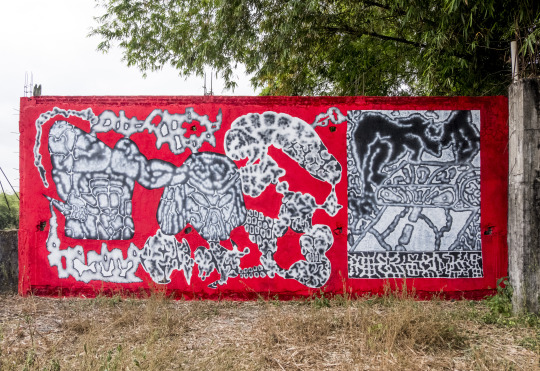
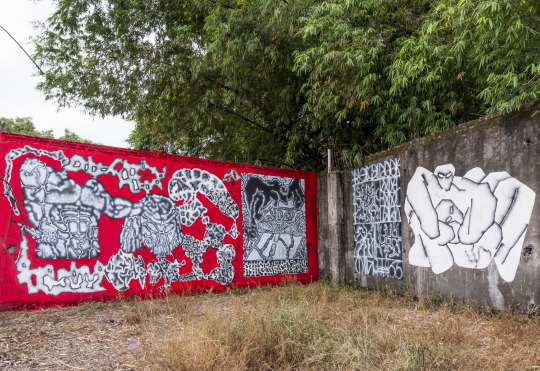
kejawen dematerialization
spray on wall
4x9 m
Jogjakarta, Indonesia
2020
110 notes
·
View notes
Link
If you drive from Cilacap, a port and trading city on the southern coast of Java Island, and head east for 45 minutes, you may spot a sign pointing to Gunung Srandil. The mountain’s name is a combination of the Javanese words “sranane” (must be) and “adil” (just).
Mount Srandil is no ordinary hill with a view of the Indian Ocean. It is also an ancient mystical complex that houses multiple shrines dedicated to Javanese saints and Hindu gods and goddesses, as well as a Buddhist temple and an Islamic mosque.
I visited the compound on a very dark evening in October 2021, with a Javanese guru accompanying me with his flashlight as well as incense and flowers.
His name is Mbah Salio, a caretaker at Mount Srandil.
Mbah Salio told me that the compound is legally the property of the Central Java army command. A notice board says the area is under the supervision of the command’s detachment on arts and property.
“President Soeharto used to be the commander,” he said.
“He often came here to meditate, not only during his [military] service, but also during his presidency.”
We walked around the vast compound, peering into each shrine.
Mbah Salio even urged me to drive to a more remote shrine. Through the dark forest, about 30 minutes from the compound, we reached the Pertapaan Cemara Putih (White Pine Hermitage) in Mount Selok. My car was the only vehicle on that village road.
Mbah Salio asked a guard, who lives nearby, for a key to open the shrine.
Inside the shrine were three cemeteries and a huge painting of the Queen of the South Coast – popularly known as the mystical goddess Nyi Roro Kidul. Mbah Salio lit incense again, saying a prayer in Javanese amid the dead quiet.
He asked me to make a wish.
I said, “Religious freedom and belief in Indonesia.”
He returned to his prayer.
We later drank tea and smoked cigarettes in the guard’s post.
“President Soeharto, when he was still in power, used to have a helipad there,” Mbah Salio said, pointing to an open field. A Buddhist temple stands near the former helipad.
Mbah Salio said he met Soeharto there when he was younger.
I asked him how he would describe Soeharto’s beliefs.
“He’s a Kejawen but he’s also a Muslim, like me,” he said. “I am a member of the Nadhlatul Ulama. I am a card-carrying member.”
Young Soeharto’s Spiritualism
Soeharto was indeed a Kejawen; a practitioner of the Javanese folk religion that marries animism, Buddhist, and Hindu traditions. Though Islam has become the dominant religion on the island since it arrived in the 1500s, traces of Kejawen are still commonly found in the beliefs and practices of modern-day Javanese Muslims.
In 1935, when he was 14 years old, Soeharto moved to Wonogiri, an agricultural town in Central Java, and got to know Romo Daryatmo, a Javanese mystic and faith healer, through his new foster father.
In Wonogiri, a young Soeharto not only enjoyed agricultural life – bathing water buffalos and working on rice fields – but also learned about Daryatmo’s spiritual life.
Daryatmo was a nominal Muslim. He knew the Koran, but more in a Javanese sense than in a conventional Islamic one. As a Kejawen practitioner, he would recite Islamic phrases but did so mostly in Javanese.
Many people in Wonogiri viewed Daryatmo as a man who had mastered arcane disciplines to establish a harmonious relationship with God and someone who was able to draw from his spiritual powers to cure the sick.
Soeharto also found in Daryatmo a missing father figure. He soon became Daryatmo’s disciple, moving into the guru’s house, where he worked as a part-time assistant, preparing his morning coffee and assisting him in writing prescriptions for herbal medication. It was a formative period that gave Soeharto valuable insight into Javanese philosophy and shaped his world view.
David Jenkins’ new book, Young Soeharto: The Making of a Soldier, 1921-1945, delves into the early life of Indonesia’s authoritarian ruler, who stayed in power for 33 years, also arguably the strongest. What emerges from the details is the story of the man who was not just a Muslim but also an ardent adherent to Kejawen in a country that has become increasingly Islamized over the last three centuries.
In his 1989 autobiography, Soeharto: My Thoughts, Words, and Deeds, written by G. Dwipayana and Ramadhan K.H, Soeharto refers to Daryatmo as a kiai, an old Javanese word for a spiritual man. When Soeharto was in power, between 1965 and 1998, he called Daryatmo at least once a week and practiced Kejawen himself.
Jenkins’ book is essential because it details Soeharto’s Kejawen upbringing and his Japanese military training during their occupation on Indonesia from 1942 to 1945.
Major General Soeharto rose to power in 1965 during a period of mass killings by the military, paramilitary groups, and Muslim militias. US diplomatic cables from Jakarta documented tens of thousands of killings of suspected Communist Party members, ethnic Chinese, as well as trade unionists, teachers, activists, and artists. Soeharto ruled Indonesia with the military’s backing, repressing opponents, seizing naturally rich lands, and abusing people’s rights.
In 1975, when President Soeharto was considering an invasion of Portuguese Timor, he flew from Jakarta to the Dieng Plateau, another mystical site for ancient Javanese rituals. He brought his guest, Australian Prime Minister Gough Whitlam, to a secret cave where Soeharto sought to receive spiritual wisdom. He decided to invade Portuguese Timor after receiving support from Whitlam, as well as US President Gerald Ford, who he met in Jakarta. The invasion had well-known, tragic human rights consequences for the Timorese people.
Giving in to Islamists
David Jenkins’ book also reveals an important aspect of Soeharto’s view of Islamists. During the 1977 general election, President Soeharto held a meeting with several Catholic leaders, including Ignatius Joseph Kasimo and Frans Seda. Even before they were seated, Soeharto reportedly told the men, “Our common enemy is Islam.”
Soeharto was clearly determined to curb the power of Indonesia’s Islamists. In 1978, he created a directorate within the Ministry of Education to service traditional religions, including Kejawen, telling the Indonesian parliament, “These beliefs are part of our national tradition, and need not to be opposed to [established] religions.”
It was a clever move against the discriminatory regulations against religious minorities that were in place when Soeharto took power. Going back to January 1946, Indonesia had established the Ministry of Religious Affairs, a government body that facilitated discrimination against religious minorities and refused to recognize or serve the country’s traditional, local religions like Kejawen. The ministry produced a narrow definition of religions in 1952, favoring only monotheistic religions including Islam and Christianity, and drafted the 1965 blasphemy law, which has been repeatedly used with deleterious effects against followers of local religions.
Soeharto did not push the Ministry of Religious Affairs to serve local religions like Kejawen, but instead put the mandate under the Ministry of Education, changing its name to the Ministry of Education and Culture.
He supported his education minister, Daoed Joesoef, himself a devout Muslim, to issue a regulation on state school uniforms that banned the jilbab, the Indonesian name for the head, neck, and chest covering worn by women and girls to promote Islamic beliefs.
Significant tensions arose between Soeharto and the military in 1988 after a close aide, General Benny Moerdani, himself a Catholic, advised Soeharto to differentiate between his official duty and his children’s business interests, which were widely alleged to be connected to corruption. Soeharto recognized that maintaining his grip on power would require eliciting support from other, opposing groups, especially the Islamists.
So in 1991, Soeharto reversed his approach toward them. He made a pilgrimage to Mecca, promoted his Islamic credentials, embraced political Islam, and extended his support for the Indonesian Association of Muslim Intellectuals, where many Islamists channel their political aspirations. The Ministry of Education and Culture issued new guidelines on school uniforms that allowed “special clothing,” which gave birth to policies allowing state schools to allow their female teachers and students to wear the jilbab.
This was the beginning of the slippery slope towards greater introduction of the Islamization in Indonesia, all for the sake of Soeharto’s continued political power. But even that power was not to last.
In 1998, after more than three decades in power, Soeharto was forced to step down in the face of massive public protests at the height of the Asian economic crisis.
The reversal of Soeharto’s efforts to support religious freedom reopened the door to establishing Sharia, or Islamic law, which was previously frowned upon under his administration. This prompted Muslim politicians in predominantly Muslim provinces to draft ordinances that reflected “Islamic values.”
“What kind of Islam is this?”
When Soeharto’s wife, Siti Hartinah, died in April 1996, the Soehartos organized the funeral like a Kejawen family. Her body was placed inside a coffin – not wrapped in white muslin in accordance with Islamic rites. There was no imam reciting the Islamic confession of faith into the ear of the deceased.
Then-Vice President B.J. Habibie visited the house with his wife and two sons. At one stage, Habibie’s 32-year-old elder son, Ilham Akbar Habibie, remarked, just a little too loudly, “What kind of Islam is this?”
On things that mattered most, Soeharto revealed that spiritually he was really a Kejawen believer, in line with the teachings of Daryatmo, who had inspired him as a youth. But his use of his Islamic credentials to maintain power backfired on him – and on Indonesia.
President Susilo Bambang Yudhoyono, who ruled between 2004 and 2014, accommodated the demands to promote Islamic Sharia. His administration strengthened the blasphemy law, leading to the prosecution and imprisonment of 125 people in a decade – a steep rise from only eight cases in the three decades during Soeharto’s rule.
The blasphemy law recognizes only six religions in Indonesia: Islam, Protestantism, Catholicism, Hinduism, Buddhism, and Confucianism. Under the Yudhoyono administration, the blasphemy law was also expanded to discriminate against smaller non-Sunni Islamic minorities, such as the Ahmadiyah and Shia sects.
The blasphemy law became a political weapon to mobilize Muslims against adherents of other religions. The prime example was the move to unseat Jakarta Governor Basuki Purnama, a Christian, who lost the 2017 local election after 500,000 Muslim protesters mobilized to demand that he should be prosecuted for defaming Islam in a public speech. Purnama also lost his freedom, ending up in prison for two years on bogus charges.
So Soeharto, a true Kejawen believer, who often visited Javanese shrines like Mount Srandil and Dieng Plateau, failed to use his perspective, knowledge, and power to promote religious freedom and belief in Indonesia. Indonesia is far worse off today because of the path Soeharto took to employ Islam to bolster his political power, and followers of local religions like Kejawen face a grave reckoning.
Mbah Salio nodded, repeatedly, when I wished for religious freedom and belief in Indonesia.
“That is also my prayer,” he whispered.
Andreas Harsono is a researcher for Human Rights Watch.
#Southeast Asia#Indonesia#Soeharto#Religion#Politics#History#Kejawen#Religious Freedom#Political Thought
29 notes
·
View notes
Video
youtube
⛔ TARI BALI VS JATENG PUTRA TEMBARAK LEAK RANGDA JATHILAN
"Pangeran iku ana ing ngendi papan, aneng siro uga ana pangeran, nanging aja siro wani ngaku pangeran. (Tuhan ada di mana saja, di dalam dirimu juga ada, namun kamu jangan berani mengaku sebagai Tuhan)" ~ Abie alief aziz
LIVE PERFOM SENI BUDAYA DESA TEMBARAK TEMANGGUNG
MORE VIDEO WACTHING :
https://www.youtube.com/watch?v=OAwYl_03e14
-------------------------------
#LEAK #TOPENGIRENG #TEMBARAK #SENI #BUDAYA
0 notes
Text
Mansur Hidayat Kini Resmi Menjabat Bupati Pemalang Sisa Masa Jabatan 2021 – 2026.
Slawiraya.Com ( Pemalang )
Mansur Hidayat Kini Resmi Menjabat Bupati Pemalang Sisa Masa Jabatan 2021 – 2026., Pengambilan sumpah jabatan dan pelantikan Bupati Pemalang dilakukan dalam sebuah upacara oleh Penjabat Gubernur Jawa Tengah Nana Sudjana di gedung Gradhika Bhakti Praja Provinsi Jateng, di Semarang, Senin (9/10/2023).
Nana Sudjana usai melantik mengucapkan selamat kepada Bupati Pemalang…
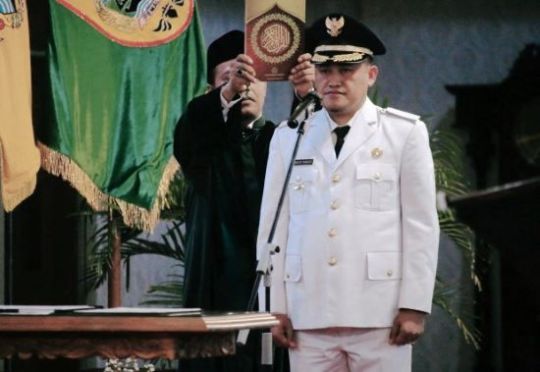
View On WordPress
#Bupati#Bupati Pemalang#Desa#Gubernur#Jawa Tengah#Kabupaten Pemalang#Kejawen#Kepala Desa#Maneges#Mansur Hidayat#PAW#Pawiwahan#Pemilu#Politik#Semarang#Wisuda
0 notes
Photo

literasi_muslimin Jika kami mendakwahkan Tauhid, mereka menuduh kami Wahabi. Dosa syirik tidak akan diampuni oleh Allah. Allah ta’ala berfirman, إِنَّ اللّهَ لاَ يَغْفِرُ أَن يُشْرَكَ بِهِ وَيَغْفِرُ مَا دُونَ ذَلِكَ لِمَن يَشَاءُ “Sesungguhnya Allah tidak akan mengampuni dosa syirik kepada-Nya, dan Dia akan mengampuni dosa lain yang berada di bawah tingkatan syirik bagi siapa saja yang dikehndaki oleh-Nya.” (QS. An Nisaa’: 48 dan 116) Allāh mengharamkan surga dimasuki oleh orang yang berbuat syirik. Allāh ta’ala berfirman, إِنَّهُ مَن يُشْرِكْ بِاللّهِ فَقَدْ حَرَّمَ اللّهُ عَلَيهِ الْجَنَّةَ وَمَأْوَاهُ النَّارُ وَمَا لِلظَّالِمِينَ مِنْ أَنصَارٍ “Sesungguhnya barangsiapa yang mempersekutukan Allah maka sesungguhnya Allah telah mengharamkan surga baginya dan tempat kembalinya adalah neraka, dan tiada seorang penolongpun bagi orang-orang zhalim tersebut.” (QS. Al Maa’idah: 72) dosa kesyirikan akan menghapuskan semua pahala amal shalih, betapapun banyak amal tersebut. Allāh ta’ala berfirman, وَلَقَدْ أُوحِيَ إِلَيْكَ وَإِلَى الَّذِينَ مِنْ قَبْلِكَ لَئِنْ أَشْرَكْتَ لَيَحْبَطَنَّ عَمَلُكَ وَلَتَكُونَنَّ مِنَ الْخَاسِرِينَ “Dan sungguh telah diwahyukan kepadamu dan kepada para Nabi sebelum engkau, ‘Jika kamu berbuat syirik maka pastilah seluruh amalmu akan lenyap terhapus dan kamu benar-benar akan termasuk orang-orang yang merugi.” (QS. Az Zumar: 65) syirik adalah kezhaliman yang paling zalim. Allāh ta’ala berfirman, وَإِذْ قَالَ لُقْمَانُ لِابْنِهِ وَهُوَ يَعِظُهُ يَا بُنَيَّ لَا تُشْرِكْ بِاللَّهِ إِنَّ الشِّرْكَ لَظُلْمٌ عَظِيمٌ “Sesungguhnya syirik itu adalah kezhaliman yang sangat besar.” (QS. Luqman: 13) syirik merupakan dosa terbesar. Rasulullah shallallahu ‘alaihi wa sallam pernah bertanya kepada para sahabatnya yang artinya, “Maukah kalian aku kabarkan tentang dosa-dosa yang paling besar?” (beliau ulangi pertanyaan itu tiga kali) Maka para sahabat menjawab, “Mau ya Rasulullah.” Lalu beliau bersabda, “Berbuat syirik terhadap Allah dan durhaka kepada kedua orang tua…” (HR. Bukhari & Muslim) #manhajsalaf #literasimuslimin #akucintasunnah #islam #syirik #dosabesar #syafaat #sedekah #larungsesaji #kejawen #adat #budaya #syukur #bancakan #tumbal #sajen (di Banjarmasin) https://www.instagram.com/p/CnP6GglBMvk/?igshid=NGJjMDIxMWI=
#manhajsalaf#literasimuslimin#akucintasunnah#islam#syirik#dosabesar#syafaat#sedekah#larungsesaji#kejawen#adat#budaya#syukur#bancakan#tumbal#sajen
1 note
·
View note
Text

Myst|cal Minyak Pe|et Aura Si|iwangi 6 Ml
#peletpemikatjitu#dukuncinta#peletampuhwanita#susukwajah#peletpemikat#minyakpengasihan#santetonline#asmara#selingkuh#asihan#tkisingapura#dukunampuh#tambangliring#tkimalaysia#like#manigajah#ilmupeletampuh#kejawen#jimatpelet#gendam#pesugihanputih#santetjarakjauh#amulet#perceraian#peletkalimantan#minyakbuluperindu#tkihongkong#takrut#farm#lobsterairtawar
0 notes
Text
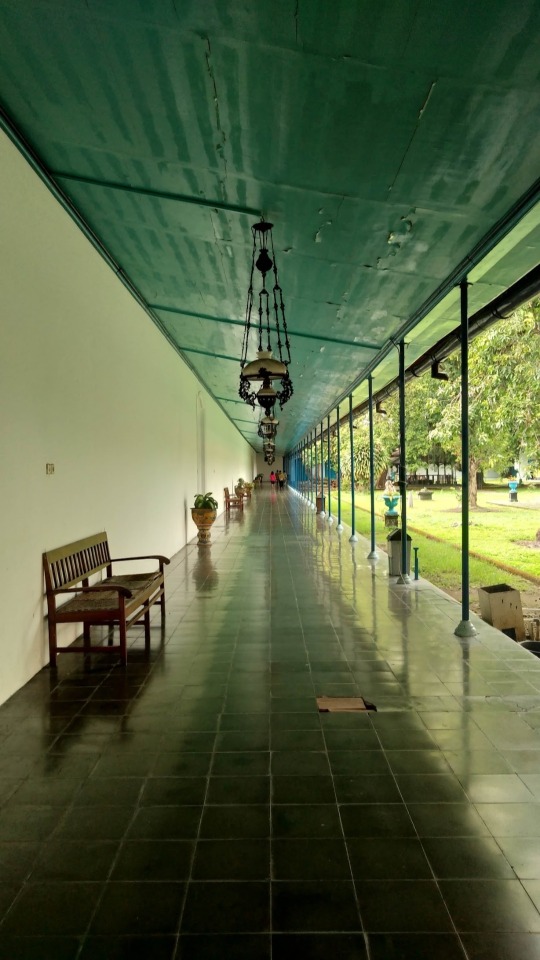
0 notes
Text
PERAHU LAYAR GAMELAN VIRAL TIKTOK | DIGITAL MANTRA
PERAHU LAYAR GAMELAN VIRAL TIKTOK | DIGITAL MANTRA
Perahu Layar Gamelan Viral Tiktok
Cipt. Ki Narto Sabdo
Arr. Digital Mantra
Yo konco ning nggisik gembiro
Anglerap-lerap banyune segoro
Angliyak numpak prau layar
Ing dino minggu keh pariwisoto
Alon praune wis nengah
Byak byuk byak banyu pinelah
Ora jemu-jemu karo mesem ngguyu
Ngilangake roso lungkrah lesu
Adik njawil mas…
Jebul wis sore
Witing kalopo katon ngawe-awe
Prayogane becik balik…

View On WordPress
#digital mantra#gamelan#gamelan perahu layar#gamelan prau layar#gending dolanan#gending dolanan jawa#gending gamelan jawa#gending prau layar#instrumental gamelan#jawa#kejawen#ki narto sabdo#maestro media#musik#musik gamelan#musik instrumental#musik kejawen#perahu layar#praon#prau layar#prau layar gamelan jawa#prau layar ki narto sabdo#prau layar lirik#tembang dolanan#tembang dolanan prau layar karaoke#tembang gamelan jawa#tembang gamelan jawa kuno
0 notes
Text
Saw a thread about sufjan's name on twitter and gotta say they did not expect the name came from an Indonesian guy
#the thread is indonesian so there is that#someone said he is bule kejawen and i cant help but cackle#with that name he could be my neighbor idk#sufjan
1 note
·
View note
Text
BERKUALITAS, SEGERA WA 0819-9933-4991, Baju Nikah Jawa Modern
KLIK https: // wa.me/6281999334991, Baju Nikah Mewah, Baju Nikah Nasional, Baju Nikah Navy, Baju Nikah Navy Blue, Baju Nikah Naruto
Kami dengan bangga mempersembahkan keloeksi blangkon berbahan kain biasa, kain yang dapat dilipat dan dapat di cuci. Menyediakan Blangkon Dengan Berbagai Ragam:
- Blangkon Batik
- Gaun Pernikahan Hijab
- Blangkon yang dapat di lipat
- Baju Pernikahan
- Pakaian Pernikahan
- Menerima pesanan sesuai request
Size: Sesuai dengan keinginan pembeli
BLANGKON TANPA BATAS
Potrojayan Jln. Nakula 2 No 32 Rt02/Rw 06 Serengan Surakarta
Kunjungi toko kami sekarang untuk melihat koleksi kami yang menarik!!!
081999334991
#kejawenstyle, #kejawentulen, #kejawen❤, #kejawenanalisindonesia, #kejawena, #kejawenasli, #kejawenankotacirebon✌👍, #kejawenblackmetal, #kejawenbukanagama, #kejawenbanget
Baju Pengantin Adat Jawa Modern Berhijab, Baju Pengantin Adat Jawa Putih, Baju Pengantin Adat Jawa Solo, Baju Pengantin Modern, Baju Pengantin Adat Jawa Hijab, Baju Pengantin Adat Jawa Tengah, Baju Pengantin Adat Jawa Jogja, Baju Nikah Adat Betawi
#kejawenstyle#kejawentulen#kejawen❤#kejawenanalisindonesia#kejawena#kejawenasli#kejawenankotacirebon✌👍#kejawenblackmetal
0 notes
Text
SMP Terbaik Kejawen Putih Tambak Surabaya, WA 0811-32-177-00

Mengapa SHAFTA?
SHAFTA merupakan Sekolah yang menggabungkan antara Pendidikan agama dan umum, mengintegrasikan antara kecerdasan intelektual dan spiritual, serta membentuk karakter para siswa-siswi dengan Akhlaq Mulia.
Teruntuk Siswa-Siswi SD/MI dan SMP/MTs yang ingin mendalami ilmu agama tapi disertai dengan keahlian di bidang lain yukk daftar di SMP - SMA Islam SHAFTA Surabaya.
Saat ini telah dibuka Gelombang 1 nih. Akan ada banyak beasiswa untuk kalian siswa yang berprestasi, dari prestasi Akademik/ non-akademik, serta kalian yang memiliki hafalan Al-Qur'an!
Gelombang 1 (17 Agustus 2023 - 18 Januari 2024)
Biaya Pendaftaran Start: 2.700.000
1. Free Catering Bulanan
2. Bebas Dana Jariyah
3. Bebas SWIP (Program Yatim)
4. Potongan SWIP (Siswa Prestasi Akademik/Non Akademik/Tahfidz)
Yuk segera daftar sekolah di Sekolah Islam SHAFTA!!
Dapatkan Juga Cashback serta Potongan biaya lainnya!!
Info PPDB: WA 0811-32-177-00 Klik
Web : www.shafta.sch.id/ppdb
Sekolah Islam Surabaya, Sekolah Islam Favorit, Sekolah Terbaik Surabaya, SMP Tahfidz, SMA Tahfidz
#SMP Terbaik Kejawen Putih Tambak Surabaya#SMP Terbaik Manyar Sabrangan Surabaya#SMP Terbaik Mulyorejo Surabaya#SMP Terbaik Bongkaran Surabay
0 notes
Text
Batu Mustika Sabdo Dadi Ampuh
Batu Mustika Sabdo Dadi Ampuh
Batu Mustika Sabdo Dadi Ampuh
Mustika Sabdo dadi adalah sebuah mustika yang dapat mengaktifkan ajian Sabdo Dadi dalam diri Manusia, Ajian ini adalah ajian yang memiliki arti segala perkataannya akan menjadi kenyataan, seseorang yang memiliki mustika ini Insya Allah segala tutur katanya akan mujarab atau menjadi kenyataan.
Keterangan Batu Mustika Sabdo Dadi Ampuh.
Produk Jenis ini bernama Batu…
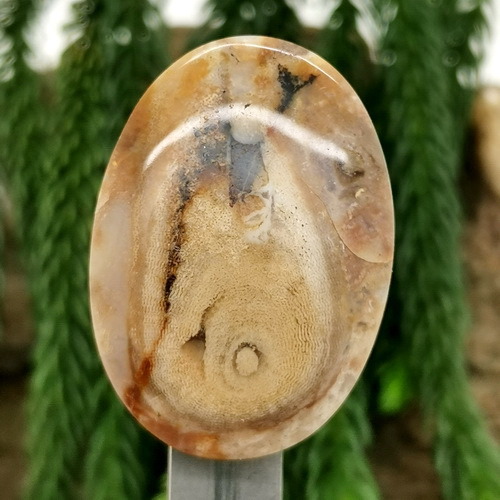
View On WordPress
#amalan sabdo dadi sunan kalijaga#Batu Mustika Sabdo Dadi Ampuh#ilmu sabdo dadi pangucap#ilmu sabdo dadi tingkat tinggi#khodam sabdo dadi#mantra sabdo dadi#sabdo dadi kejawen
0 notes
Text
Demi Bersatunya Indonesia, Seorang Pria di Gresik Menikah Dengan Domba
Demi Bersatunya Indonesia, Seorang Pria di Gresik Menikah Dengan Domba
GRESIK, MaduraPost – Pernikahan itu sakral. Umumnya, pernikahan antara mempelai pria dan wanita. Namun apa jadinya jika seorang pria menikahi domba? Prosesi sakral pernikahan antara seorang pria dan seekor domba betina dilaksanakan di Pesanggrahan Kramat “Ki Ageng”, di Desa Jogodalu, Kecamatan Benjeng, Kabupaten Gresik, pada Minggu sore, 5 Juni 2022.
Mempelai pria ialah Spritualis Nusantara…
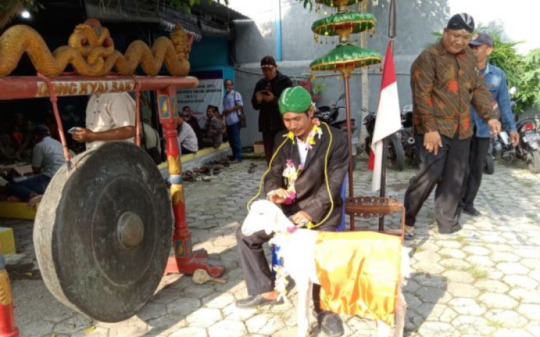
View On WordPress
0 notes
Text
Tl;Dr - Primbon is like a type of "Zodiac System" for the Javanese where we use nature, astrology etc as a tool for divination, cleansing, etc.
----
I want to ramble a little about Indonesia's old spirituality, mythicisms and beliefs!!
I'm not entirely religious but ever since I practice Tarot, I have this belief of souls and spirit guardians in divination, and the more I practice divination the more I feel rooted into our culture's old beliefs.
Anyway, this has nothing to do with that... kinda.
Here in Java, we have this old manuscript called Primbon Palintangan Palindon Pakedutan, it contained texts on physiognomy and astrology, as well as other subjects.
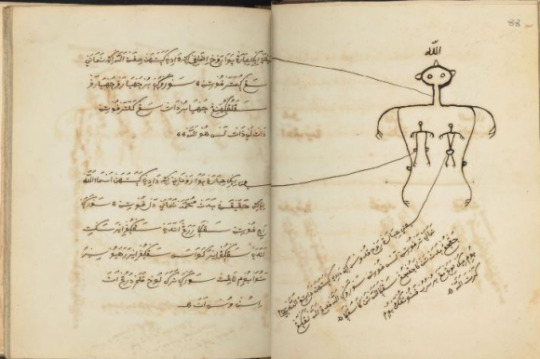
In this age, to believe in Primbon can be seen as Syirik and could lead to blasphemy.
According to KBBI, Primbon is defined as a Book consisting of forecast, knowledge of kejawen, occultism, a peculiar numeric system for calculating lucky days, prayers, selections from the Qur’an, instructions relating to ritual purity and performance of obligatory worship, texts on mysticism, astronomy, astrology, and every other important matter.
This book is mainly oriented towards the relationship between mankind and nature and is used as a life guide for Javanese people. Jogja also have their own Primbon called Bataljemur Adammakna!
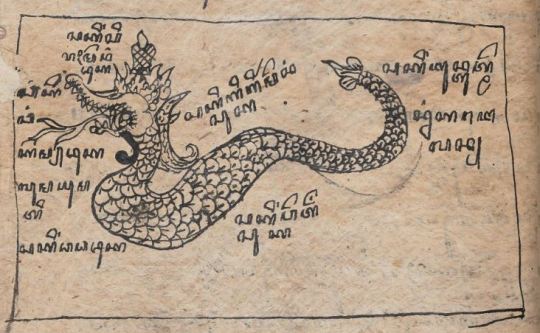
Primbon uses the Javanese calendar where every day, month, and year has its own calculation and is used to identify events that could occur in the future. It could be used as divination and a tool to hone vigilance.
There are eleven teachings;
Pranata reads the universe and petungan are the numbers that reads your fate
Pawukon calculates time and dates
Perobatan, where medicinal Primbon filled with prayers, spells and spiritual intentions are inscribed into a piece of paper and then burnt. Its ashes can then be rubbed on an affected area to heal.
Wirid are messages, suggestions, or prohibitions that are considered necessary to be followed for the sake of creating harmony
Aji-aji reflects the supernatural side of Javanese life. It is believed that extraordinary supernatural powers are contained in a spell if it is truly believed.
Kidung is a song and / or poetry that contains advice and such.
Ramalan means Divination, it is self explanatory...
Kawilujengan contains guidelines about the implementation of Javanese rituals for various purposes.
Donga is similar to Aji-aji but uses the verses from the Quran and spelled in Javanese
Finally, Ngalamat or sasmita is usually a strange phenomenon in the universe that is considered an oddity. The phenomenon is then interpreted as a sign of something.
Basically, Primbon is like zodiac systems and common astrology for us!!! Also the Brits took six volumes in 1812!!!!!! Give it back along with our legendary Keris!!!!!!! Please :(
27 notes
·
View notes
Text
Rehab Rumah Tidak Layak Huni Kabupaten Tegal Tahun 2023 Menelan Anggaran Milyaran.
Slawiraya.com ( Slawi )
Kegiatan perbaikan atau rehab rumah tidak layak huni (RTLH) di Desa Lebakgowah dan Desa Lebaksiu Lor Kecamatan Lebaksiu sebanyak 18 unit, telah selesai 100 persen, Dana stimulan perbaikan RTLH senilai Rp 20 juta yang diperuntukkan bagi warga miskin ini guna memenuhi standar hunian sehat.
Dilansir dari situs resmi Pemerintah Kabupaten Tegal, .Bupati Tegal Umi Azizah telah…
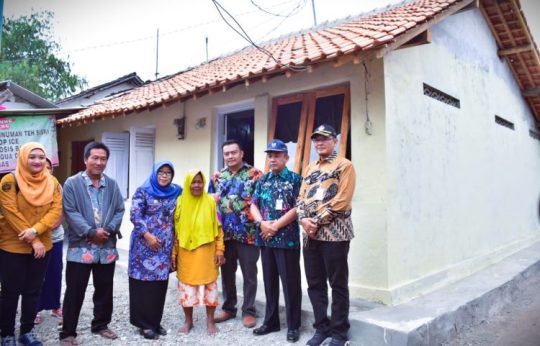
View On WordPress
#Bupati#Bupati Tegal#Desa#Desa Lebakgowah#Jawa Tengah#Kabupaten Tegal#Kecamatan Bojong#Kejawen#Kepala Desa#Maneges#PAW#Pawiwahan#Wisuda
0 notes
Text
Kejawen
Akhir bulan ini saya dan keluarga telah selesai melaksanakan pernikahan adik yang nomor dua di Nganjuk Jatim.
Apa yang menjadi catatan?
Ternyata tetap tentang klenik kejawen dan hitungan weton.
Sangat membagongkan ketika mengetahui pihak keluarga mempelai perempuan sangat mempercayai, atau mungkin meyakini nya melebihi keyakinan terhadap kekuatan Bismillah.
Kenapa kok demikian?
Iya, karena serasa mereka terlalu mempersulit diri, akhirnya pihak keluarga kami juga menjadi kesulitan. Bahkan baru ini tau ada foto ka’bah bersanding dengan sesajen di dalam rumah. Sesajennya di tiap pojokan ada. Saya melihatnya dengan mata dan kepala sendiri. Padahal kedua orang tuanya merupakan guru, berarti orang terdidik.
Normally harus cuti seminggu, padahal di februari itu ada tanggal merah bisa satu minggu, ga perlu cuti lima hari. Cuti setengah tahun udah aja gitu digunain karena si mbah dukun nya. (Oh ya benar, mbah dukunnya tanggalannya hitam semua).
Belum lagi soal tanggal yang digeser, malah mereka ga mau, karena mereka mempercayai hari baik itu. Lebih malah mengorbankan semua orang agar cuti dari kerjaannya di hari senin dan selasa untuk pesta.
Apakah aku percaya?
Tidak.
Dulu di Maiyah Cak Nun juga pernah dibahas tentang masalah ini.
Kita tidak bisa menyalahkan hal-hal tersebut, walaupun juga tidak bisa membenarkan nya. Namanya juga pencarian orang-orang terdahulu mengenai “kekuatan” yang lebih superior di bandingkan daya jangkau manusia.
Namun kita tetap harus yakin, ainul yaqin, haqqul yaqin, bahwa Bismillah kita lebih ampuh dari pada itu semua.
Apa bukti kalo tidak percaya?
Saya anak nomer satu (siji) dan istri anak nomer tiga (telu). Di konsep jawa, anak SIJI dan TELU alias (JILU) itu pantang buat menikah.
Mohon maaf, saya bismillah. Dekengane Pusat!
Jadi gimana?
Kita sudah punya syariat islam yang benar-benar memudahkan. Ga pake ribet. Akad nikah walimah selesai, ga pake sesajen, ga pake embel-embel lainnya.
MasyaAllah, syariat yang dibawa Nabi Muhammad bener-bener memudahkan.
Lalu gimana kalo mau pake adat?
Menurut saya ya gapapa, dipersilahkan. Yang penting keyakinan kita tidak rusak karena sesajen atau omongan dukun itu.
Nanti kalo ga nurut dukun nikahnya jadi amburadul, nanti kalo dapurnya ga dikasih sesajen makanannya jadi cepet busuk.
Lah, itu mah namanya tukang masaknya ngga kompeten. Ngapain nyalahin yg ga ada sama masakan?
Anak-anak generasi sekarang juga banyak yang memakai adat, ngga apa-apa jika yang dipakai hanyalah secara konsep acara, tidak sampai merusak keyakinan.
Kasian lo, udah berusaha sholat puasa zakat, namun harus dirusak perkara yang demikian.
Mari saling menjaga dan mengingatkan.
Ngono ya ngono, tapi ojo ngono.
Sekali lagi, kita tidak bisa menyalahkan hal-hal tersebut, walaupun juga tidak bisa membenarkan nya. Namanya juga pencarian orang-orang terdahulu mengenai “kekuatan” yang lebih superior di bandingkan daya jangku manusia.
Namun kita tetap harus yakin, ainul yaqin, haqqul yaqin, bahwa Bismillah kita lebih ampuh dari pada itu semua.
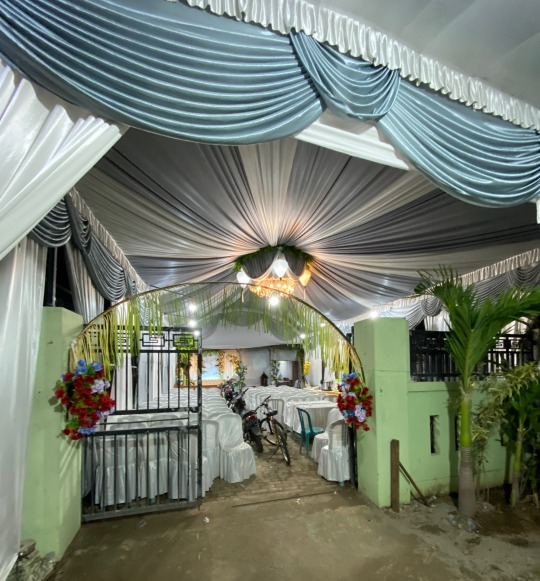
7 notes
·
View notes